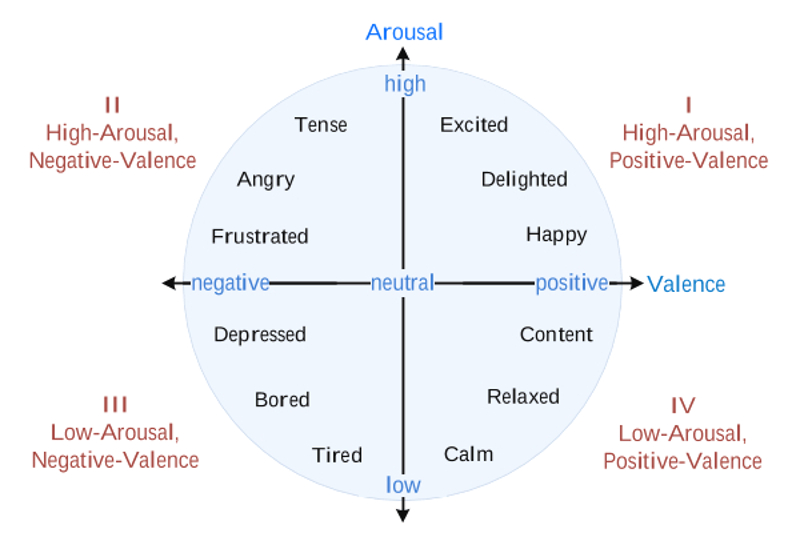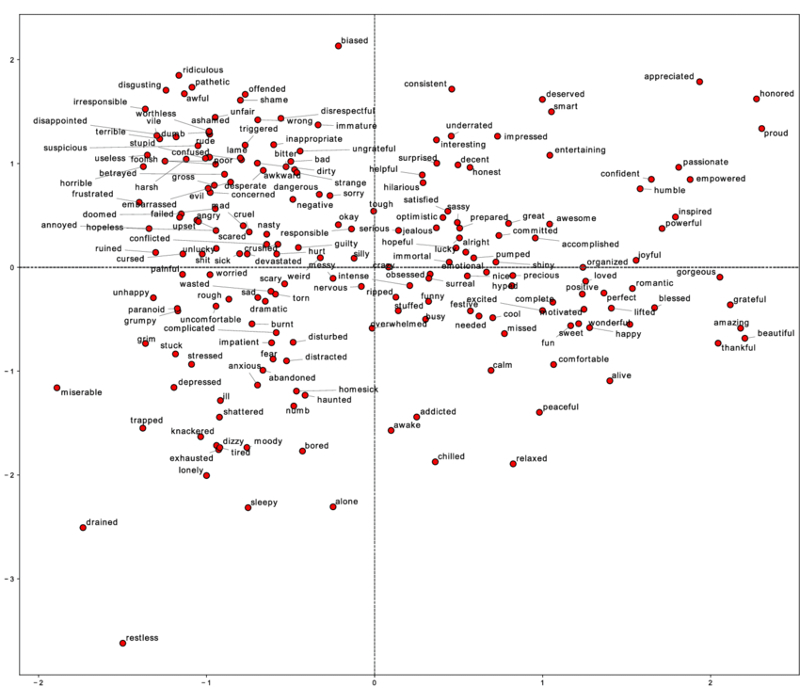One of the great things about fun is the diversity of accessible, personalized options. In all honesty, what you consider fun is probably another person’s nightmare. For instance, I often talk about my fondness for loud music in contrast to my wife, whose idea of a great time is curling up with a good book. Much of what we consider fun comes down to preference. By asking ourselves questions like, “What types of activities do I enjoy?” or “Am I more engaged when something is activating or relaxing?” we will likely see a fun type preference begin to emerge. If you’re mainly curious about what your fun type is, try out the Fun Type Calculator (and check out the Fun Types Explained section below when you’re done!). If you’re also interested in the science behind it, keep reading.
In creating the Fun Type Calculator, a number of different studies and models surrounding positive valence and emotion were used, beginning with the 2-dimensional Circumplex model of emotions.

2-dimensional Circumplex Model of Emotions. Russell, J. (1980). A circumplex model of affect. Journal of Personality and Social Psychology.
For the calculator, the two right-hand quadrants were the primary focus, with fun defined as “anything on the positive side of valence.”
From there, research was expanded to the findings of Liu et al. who built a more comprehensive model of emotions based on valence (horizontal axis) and arousal (vertical axis) called Seemo. Their model maps 197 human emotions, also distributed into four quadrants. For fun purposes, only the emotions from the upper and lower right quadrants are included in the fun type calculation.

197 emotions along the two derived principle components from Seemo. Zhe, L., Xu, A, Gao, Y., Mahmud J., Liu, H., Akkakiraju, R. (2018). Seemo: A Computational Approach to See Emotions.
Additionally, Liu et al. analyzed 20,000 tweets to determine which words people use to express emotions of a certain type. These words were matched with the two typologies of fun found in the literature and their related emotions, based on the PERMA framework by Seligman and gamification theory by Lazzarro. With the combination of all these models – and a little wizardry – the Fun Type Calculator was born.
It’s still a work in progress, so I will be sure to document the changes here as the model is improved and fine-tuned through increased use and user feedback.
Fun Types Explained
So you’ve taken the quiz and you want more information. What does it really mean to be an Enthusiast, a Pathfinder, a Free Spirit, or a Socializer? Here we go:
FUN TYPE: THE ENTHUSIAST
You have fun with a purpose. For you, fun is at its best when you are participating in something larger than life and bigger than yourself. You want to be inspired and to change the world. While some may think you take fun a bit too seriously, nothing can take away from your dedication, especially when you’ve found a cause you’re passionate about. Work is sponsoring a 5k? You’re there and you’ve faithfully raised the most awareness (and dollars). Read a life-changing book recently? You reviewed it on GoodReads, Amazon, and Audible right before you purchased it for any and all the people in your life who could benefit from it. Time flies when you’re having (meaningful) fun!
FUN TYPE: THE PATHFINDER
Your idea of a good time is not necessarily taking it easy – you like a challenge. If at the end of a “fun” day you can’t say you achieved something, then “fun” is not how you would describe that day. To you, fun means rising to the occasion, using the problem-solving parts of your brain, and achieving mastery. You want all the escape rooms, puzzles, and rock-climbing walls. You strategize, you practice, and you get. the. job. done. You are driven both at work and in play, committed to conquering your goals no matter what you have to overcome. There is nothing sweeter or more fun to you than feeling accomplished and saying, “I did it!”
FUN TYPE: THE FREE SPIRIT
Autonomy lives at the center of your fun. While you might do things many other people do, the way you do them is what counts. You’re a natural limit-tester; creativity is your bread and butter. You find yourself seeking opportunities to take exploration to new heights, whether it’s a new city or an imaginative activity you’ve never tried before. Where the word “freestyle” may cause others to freeze, doing your own thing makes you feel alive. You go for a drive to see where the road takes you, stop at a side-of-the-road restaurant, and order a dish the server recommends. You do yoga with your eyes closed on top of a mountain just to see if you can. Fun is wherever you’re with you.
FUN TYPE: THE SOCIALIZER
Your fun is a collective one. Not that you can’t hang with yourself, but why be alone when you can be with your people? You are in your element when you’re connecting to your community. You love friendly competition, especially when it gives you an opportunity for teamwork. You’re the first person to start the games at your family reunion, the last to leave at the end of any event, and you know FOMO is real – mostly because you’re the perpetrator via the pictures you post on social media and tag EVERYONE in. You soak up as much bonding time as possible with those you care about, and your list of “Fun Things That Bring Me Joy” is stacked with relationships you hold dear.
To wrap up, don’t forget the first and foremost rule of the Fun Type Calculator (it’s in the title): FUN! So when you catch yourself wondering, “Can I really be a Socializer if I’m introverted?” or maybe you assumed you’d be a Pathfinder, but no matter how many times you take it, you can’t seem to hit the sweet spot: Fun is fun is fun. Maybe some days achievement is your jam and others you just want to do your own thing. My own fun type is Socializer, but I definitely have Pathfinder tendencies. Depends on the day.
We are all people, which means the only true constant is change.
If you think we got it right (or wrong) drop a comment with your thoughts on the calculator below! Was your type the one you expected? Has it inspired you to try something new? All thoughts are welcome!
Sources and Further Reading:
Lazzaro, N. (2004). Why we Play Games: Four Keys to More Emotion without Story. Game Development Conference.
Lazzaro, N. (n.d.) 4 Keys 2 Fun. Available at http://nicolelazzaro.com/wp-content/uploads/2012/03/4_keys_poster3.jpg
Marczewski, A. (2013). Gamification User Types and the 4 Keys 2 Fun. Available at: https://www.gamified.uk/2013/06/05/gamification-user-types-and-the-4-keys-2-fun
Russell, J. (1980). A circumplex model of affect. Journal of Personality and Social Psychology. 39 (6): 1161–1178
Seligman, M. (2018): PERMA and the building blocks of well-being. The Journal of Positive Psychology
Zhe, L., Xu, A, Gao, Y., Mahmud J., Liu, H., Akkakiraju, R. (2018). Seemo: A Computational Approach to See Emotions. Conference paper. 1-12. 10.1145/3173574.3173938.

Yes, the fun type was exactly what I would have expected. Unfortunately the COVID pandemic (yes, I am still trying to be careful) has made it harder to socialize, and I miss it!